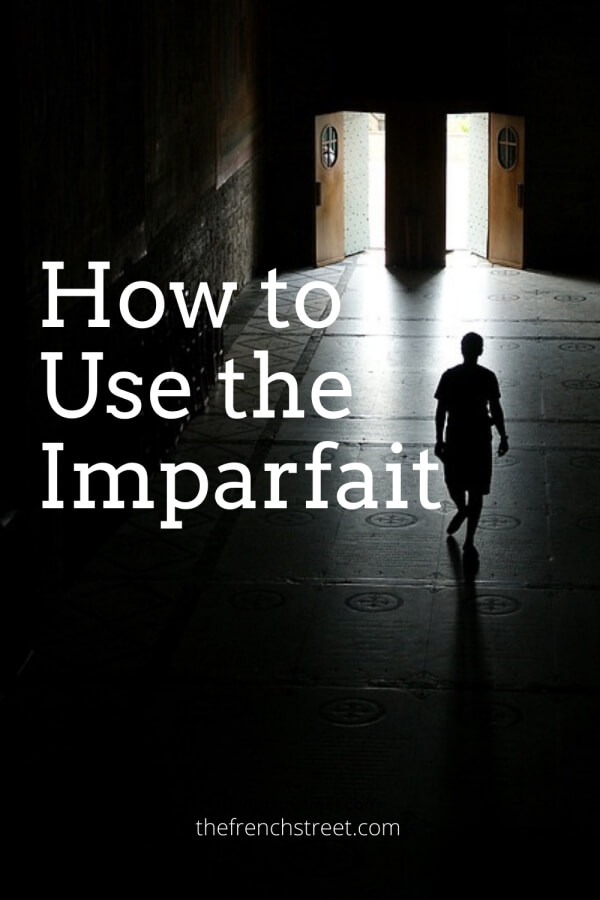In a previous post, we talked about the passé composé, which is one of the most common structures to talk about the past in French. Today, we will talk about another structure that is equally used: the imparfait, or how the French call it, l’imparfait.
We will learn how to use the imparfait and when you should use it. It’s probably less complicated than its brother, the passé composé. We will explain its different uses and provide you with several examples for a better understanding. By the end of this post, you should be able to use it in your conversations. Are you ready? C’est parti!
What is the Imparfait?
The imparfait is a past tense used to describe states of being and actions that were ongoing or repeated in the past. In English, we use the auxiliary be + present participle to talk about continuous actions in the past. This is what we call past continuous or past progressive.
Example: Je dormais quand tu m’as appelé. I was sleeping when you called me.
To talk about habits in the past, we use would or used to.
Example: Il jouait au football au lycée. He used to play soccer in high school.
The good news is we only conjugate the main verb when talking about ongoing actions or past habits in French. Unlike English, we don’t have to worry about the verb to be or used to/would. Isn’t that great?
When Do We Use the Imparfait?
Now that we know what it is, we need to know when to use it. We use the imparfait in the following situations:
To describe a past situation.
Example: Quand j’étais petit, je détestais le brocoli. When I was little, I hated broccoli.
To describe someone or something in the past.
Example: Chloé était une fille très timide. Chloé was a very shy girl.
To talk about past habits.

Example: Mes enfants regardaient Sesame Street tous les jours après l’école. My children used to watch Sesame Street e
very day after school.
To talk about two simultaneous actions in the past.
Example: Papa lisait le journal pendant que maman préparait le petit déjeuner. Dad was reading the newspaper while Mom was making breakfast.
How Do We Form the Imparfait?
Remember we mentioned earlier that it’s easier to conjugate verbs to form the imparfait? To form it, we need to add the following endings to the root of the verb:
Je – ais
Tu – ais
Il/Elle/On – ait
Nous – ions
Vous – iez
Ils/Elles – aient
Note that the endings above apply to verbs ending in -er, -ir, and -re. Let’s conjugate the verb marcher (walk) for a better illustration:
Je marchais
Tu marchais
Il/Elle/On marchait
Nous marchions
Vous marchiez
Ils/Elles marchaeint
Did you notice we dropped the ending -er and added a different ending depending on the person?
Exceptions when Conjugating
As with all things, there are some exceptions you have to keep in mind when conjugating French verbs. Normally, we would only drop the ending of a verb and replace it with -ais, -ait, -ions, -iez, or -aient. However, it’s a little bit different with some verbs.
For those verbs ending in -ger, we just drop the r and add the corresponding ending. Let’s conjugate the verb manger (eat) as an example:
Je mangeais
Tu mangeais
Il/Elle/On mangeait
Nous mangions
Vous mangiez
Ils/Elles mangeaient
Did you notice this rule does not apply to the conjugations for nous and vous? For the rest, we add an -e to keep the soft g sound. Otherwise, the g would be pronounced like the g in game.
For those verbs ending in -cer, we drop -er, substitute ç for c, and add the corresponding ending. Let’s conjugate the verb avancer (advance) as an example:
J’avançais
Tu avançais
Il/Elle/On avançait
Nous avancions
Vous avanciez
Ils/Elles avançaient
Except for the conjugations of nous and vous, we use a cedilla to keep the s pronunciation. If we didn’t do this, the c would be pronounced like the c in car.
Finally, for those verbs ending in -ir, we add iss to the root of the verb before adding the corresponding ending. Let’s conjugate the verb choisir (choose) as an example:
 Je choisissais
Je choisissais
Tu choisissais
Il/Elle/On choisissait
Nous choisissions
Vous choisissiez
Ils/Elles choisissaient
Impartfait or Passé Composé?
Many students confuse the imparfait and the passé composé. After all, we use those two structures to talk about the past, right? Some situations will help us determine which one we should choose. But don’t worry. We will talk about that in a later post. I don’t want to overwhelm you now.
Conclusion
The imparfait is relatively easy to use to talk about the past. We use it in the following cases:
- To talk about a past situation.
- To describe someone or something in the past.
- To talk about past habits.
- To talk about two simultaneous actions in the past.
It’s the equivalent of past continuous/past progressive and habits with would/use to in English.
In most cases, the conjugation rules are straightforward, but there are some exceptions. You will have to memorize the rules for conjugating those verbs ending in -ger, -cer, and -ir. It’s just a matter of practice.
What do you think? Is the imparfait easy? Let me know in the comments below. Au revoir, les amis!



I have never had contact with people who speak French and I am sorry for that. I think that French is very rich and I have to say juicy when listened to. This is the first time I’ve heard of Impartfait and reading this article I don’t think it’s that hard to use. In any language, to use a past situation, we use the past tense.
Thanks a lot this is such valuable information
Hi, Oliveir,
If you’re interested in learning French, I recommend you check out this article. Getting a tutor/teacher is crucial to pursue your goals.
Feel free to check out my other articles for more info and tips on the French language. I not only write about the language but about the culture as well.
Thanks for commenting.
Wow, thanks for sharing this article, French has always been a language I always admire, i learnt little in high school, and always wanted to further, this website really looks like the perfect place for that, the explanations are really in detail and the mode of teaching is also made easy, i really enjoyed reading this article, thanks again
Hi, Collins,
Glad you liked it. Feel free to check out my other articles for more info and tips on the French language and culture.
Thanks for commenting.